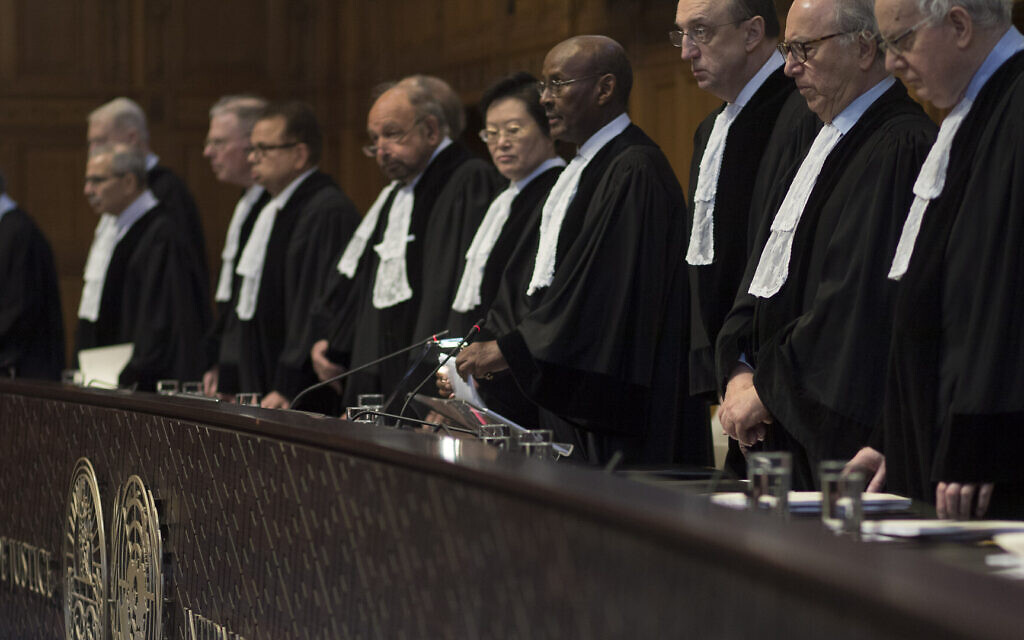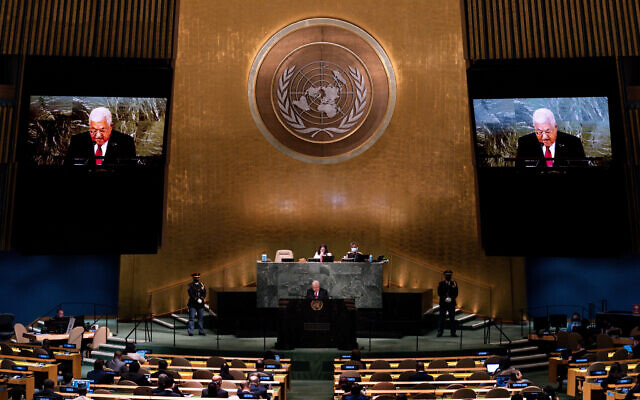Hague court could use ‘apartheid’ label and call for expanded probes, just as Israel’s new hardline government pledges to press what it believes to be its rights to the West Bank

To absolutely no one’s surprise, the United Nations General Assembly on Friday night voted to approve a resolution requesting that the International Court of Justice intervene and render an opinion on the state of the Israeli-Palestinian conflict.
Foreseeing the loss, Israeli officials had been lambasting the UN process for weeks, saying the world body was hopelessly biased and that the move damages chances for peace. “The Palestinians want to replace negotiations with unilateral steps,” warned then-Prime Minister Yair Lapid after a preliminary vote in November. “They are again using the United Nations to attack Israel.”
Those warnings were no mere bluster. Though the ICJ will render only an advisory opinion, there is a real danger that a strident ruling in favor of the Palestinians could alter Israel’s standing in the world, while kicking off a wave of calls for sanctions on the Jewish state. It could indeed drive the Palestinian Authority further from compromise with Israel.
And with a new hardline Israeli government getting to work just as the court begins its own process, Jerusalem’s goal of softening the anticipated blow becomes an even steeper challenge.
Silver lining
Despite the passage of the resolution — titled “Israeli practices and settlement activities affecting the rights of the Palestinian people and other Arabs of the occupied territories” — Jerusalem actually feels it chalked up several wins on Friday.
Officials pointed to what they said was a marked shift toward Israel’s position compared to the November 11 preliminary vote at the UNGA Fourth Committee. That first vote saw 98 countries support the resolution, 17 oppose and 52 abstain.

On Friday night in the full assembly, only 87 countries were in favor, 26 voted no, and a nearly identical 53 abstained or didn’t show up.
Importantly for Israel, which had sought to show that democracies rejected the move, most European states did not vote yes. And in a sign that Israel’s long-term efforts in Africa are bearing fruit, most countries in sub-Saharan Africa also did not vote for the resolution.
“It gives us some leverage ahead of the debate in the court,” a Foreign Ministry official told The Times of Israel on Sunday.
The process begins
The baton now passes to The Hague, where the ICJ registrar, Belgium’s Philippe Gautier, will soon publish the court’s schedule for the coming months. UN member states and NGOs will be invited to offer amicus briefs to the court setting out positions, as part of a broader fact-finding stage.
The process moves slowly, and the court is expected to deliver its advisory opinion in a public session only after a year or more.
Foreign Ministry sources told The Times of Israel that Jerusalem still hasn’t formulated its approach to the ICJ proceedings, but is unlikely to participate formally.
However, it can make sure that its positions do reach the justices through allied countries and sympathetic NGOs.
On UNGA ICJ vote, @IsraelMFA efforts to shift votes had real results – * From Yes 👉 No: Kenya
*From Yes👉 Abstain/No Sho: Afghanistan, Antigua, Brazil, Cape Verde, Chad, Comoros, Dom Rep, Gabon, Niger, Panama, East Timor, Ukraine, Uzbekistan 1/3— Lazar Berman (@Lazar_Berman) January 1, 2023
Israel’s response, which had so far been handled by the Foreign Ministry’s International Organizations Division, has now been moved to a task force headed by the ministry’s legal advisor.
Regardless of the makeup of the vote at the General Assembly, and no matter what Israel does behind the scenes, the contours of the eventual ICJ position are effectively preordained, argued Pnina Sharvit Baruch, law and national security expert at the Institute of National Security Studies in Tel Aviv.
“The opinion will not be favorable to Israel,” she predicted. “We can assume that it will talk about an illegal occupation that doesn’t have an end date [and] that harms the Palestinians’ right to self-determination, that there is a de facto annexation, and there will surely be something about Jerusalem.”

Still, there are important potential elements to the future decision that will determine how damaging the ruling is for Israel.
In a best-case scenario for Israel, some ICJ justices will publish minority opinions that are more sympathetic to Israel’s positions than the majority ruling.
On the other extreme, the court could slap the “apartheid” label on Israel, which does not appear in the UN resolution. It could also publish a series of recommendations asking other international bodies, including the International Criminal Court, to continue investigating Israel.
Jerusalem could then find itself facing a reinvigorated Boycott, Divestment and Sanctions (BDS) movement, limited markets for settlement products, investigations of individual Israeli officials, doors closed in diplomats’ faces, and even renewed violence from Palestinians.
The end of a negotiated peace
Even with the active cooperation of allies like the US, Israel’s ability to push the proceedings in a favorable direction is limited.
But it can certainly move the dial in the other direction.
“The more we do things that are seen as annexation, especially de jure annexation,” said Sharvit Baruch, “the more we blur the Green Line, or take steps that show that there is no intention to ever end rule over the Palestinians…all of [these] will be relevant on the decisions itself and how harsh it is, and especially for what will be done with it afterward.”

Netanyahu’s new hardline government may well pursue the type of policies that could push the ICJ to render a more strident judgment against Israel. It has signed coalition agreements that include vague commitments to annex West Bank territory to Israel, a pledge to legalize dozens of unauthorized settlements, and the provision of large funds for road building and public transport in the West Bank.
In its coalition guidelines, the government insisted that “the Jewish people have an exclusive and inalienable right to all parts of the Land of Israel,” which includes East Jerusalem, the West Bank and the Golan Heights.
But if the ICJ does come down heavily on Israel, it could paradoxically put the nail in the coffin of a negotiated solution to the Israeli-Palestinian conflict the international community says it wants — encouraging the Palestinian Authority not to compromise at the negotiation table, but instead to continue appealing to international organizations to hurt Israel’s standing without having to give up anything in talks.
As reported by The Times of Israel
